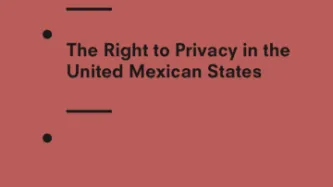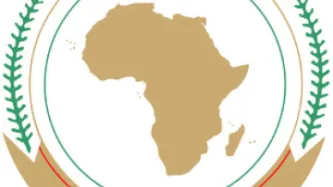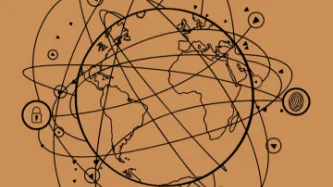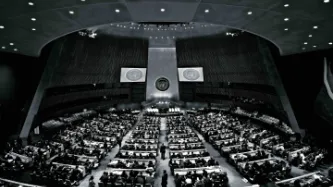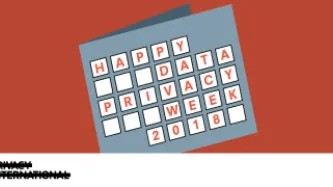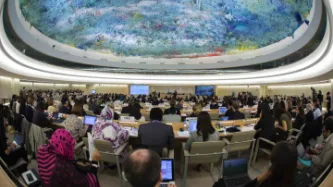Search
Content type: News & Analysis
This post was written by William Marks, a former volunteer at Privacy International.
The right to privacy is central to the protection of human dignity, and supports and reinforces other rights, such as the right to freedom of expression and association. Privacy International, supported by the International Human Rights Clinic at Harvard Law School, recently submitted a joint stakeholder report to the United Nations Human Rights Council regarding New Zealand’s protection of the right to…
Content type: News & Analysis
Our intervention comes on the back of mounting evidence that the South African state’s surveillance powers have been abused, and so-called “checks & balances” in RICA have failed to protect citizens’ constitutional right to privacy.
Among our core arguments are:
That people have a right to be notified when their communications have been intercepted so that they can take action when they believe their privacy has been unlawfully breached. Currently RICA prevents such notification, unlike…
Content type: Advocacy
This report is presented by Red en Defensa de los Derechos Digitales (R3D) and Privacy International (PI). La Red en Defensa de los Derechos Digitales (R3D) is a non-governmental, non-profit organisation located in Mexico, dedicated to the defence of human rights in the digital environment. Privacy International (PI) is a non-governmental, non-profit organisation located in London, focused on the defence, promotion and protection of the right to privacy around the world.
PI and R3D wish to…
Content type: Impact Case Study
PI and our global partners have been at the forefront of challenging communications data retention for over a decade.
What is the problem
Communications data, also known as metadata, tells a story about your digital activity and answers the who, when, what, and how of a specific communication. While communications data doesn't include the contents of a message, all of the other information about the message can be very revealing about people, their habits, thoughts, health and personal…
Content type: Impact Case Study
What is the problem
For over two decades we have been documenting an alarming use and spread of surveillance. It is no longer just the wars on terror or drugs or migration that is driving this trend. The management of health crises and distribution of welfare regularly are among others being used to justify this turn to increasingly invasive forms of surveillance. From country to country we see the same ideas and the same profiteers expanding their reach.
When we first released our report on…
Content type: News & Analysis
Image was found here.
As part of Privacy International’s mission, we aim to take the issues emerging from our research and that of our partners to new spaces of debate and to the attention of stakeholders at the national, regional and international level.
In April 2018, Privacy International was able to engage for the first time with the African Commission on Human and People's Rights (ACHPR) at its 62nd Ordinary Session, which took place in Nouakchott, Mauritania.
The right to privacy does…
Content type: Advocacy
A new Privacy International report based on an international collaborative investigation carried out by 40 NGOs in 42 countries has found alarming weaknesses in the oversight arrangements that are supposed to govern the sharing of intelligence between state intelligence agencies, including in the UK. Privacy International urges governments to enact urgent reforms and improve public understanding about the scope of intelligence sharing and the safeguards and oversight currently in place.
Content type: Long Read
A major new report published today by Privacy International has identified alarming weaknesses in the oversight arrangements that are supposed to govern the sharing of intelligence between state intelligence agencies.
'Secret Global Surveillance Networks: Intelligence Sharing Between Governments and the Need for Safeguards' is based on an international collaborative investigation carried out by 40 NGOs in 42 countries.
Previously undisclosed documents obtained by PI via litigation in the…
Content type: News & Analysis
El 10 de mayo de 2018, en el marco del 30º período de sesiones del Examen Periódico Universal (EPU) en el Consejo de Derechos Humanos de las Naciones Unidas, toca la revisión de Colombia, lo que es una oportunidad Colombia y otros Estados para declarar qué acciones han tomado para mejorar la situación de derechos humanos en sus propios países, para cumplir sus obligaciones internacionales en la materia.
Colombia se encuentra actualmente en un punto de inflexión, debido al proceso de transición…
Content type: News & Analysis
On 10 May 2018, Colombia’s human right record will be reviewed as part of the 30th session of the Universal Periodic Review (UPR), under the auspices of the Human Rights Council, which provides the opportunity for each State to declare what actions they have taken to improve the human rights situations in their countries and to fulfil their human rights obligations.
Colombia is at an important turning point in its history as it transitions from four decades of conflict. This provides…
Content type: Explainer
Phone networks are divided between two networks: the physical and the mobile. The physical runs on the Public Switched Telephone Network (PSTN) that serves your home phone. Mobile networks are dominant in the age of communication and are used to relay mobile communications to the PSTN. The most prominent mobile networks are GSM networks (Global System for Mobile communications) and are what we use everyday to communicate with one another. Another system is known as CDMA (Code Division Multiple…
Content type: Explainer
Video surveillance technologies are deployed in public and private areas for monitoring purposes. Closed-circuit television (CCTV)– a connected network of stationary and mobile video cameras– is increasingly used in public areas, private businesses and public institutions such as schools and hospitals. Systems incorporating video surveillance technologies have far greater powers than simply what the camera sees. Biometric technologies use the transmitted video to profile, sort and identify…
Content type: Press release
Below is a joint statement from Privacy International and Bytes for All.
This Friday, 27 September, marks the conclusion of the 24th session of the UN Human Rights Council, a session which has, for the first time, seen issues of internet surveillance in the spotlight. Privacy International and Bytes for All welcome the attention given at the Human Rights Council to this issue. However, we are concerned about developments which took place that threaten privacy rights and freedom of…
Content type: News & Analysis
The following piece originally appeared on Linda Raftree's "Wait...What" blog, a site focusing on bridging community development and technology.
New technologies hold great potential for the developing world, and countless development scholars and practitioners have sung the praises of technology in accelerating development, reducing poverty, spurring innovation and improving accountability and transparency.
Worryingly, however, privacy is presented as a luxury that creates barriers…
Content type: Press release
The Case
Privacy International v Secretary of State for Foreign and Commonwealth Affairs et al. (Bulk Personal Datasets & Bulk Communications Data challenge)
Date: 5-9 June 2017
Time: from 10:00 onwards
Location: Royal Courts of Justice, The Strand, London WC2A 2LL United Kingdom
Hearing overview
Next week’s hearing follows the Investigatory Powers Tribunal’s earlier judgment in October 2016, which ruled that three issues are to be determined:
…
Content type: News & Analysis
11 November 2014
With a draft United Nations General Assembly resolution on the right to privacy in the digital age expected to come in a mere few weeks, negotiations on this key international document have reached a critical stage.
This year's resolution creates a significant opportunity to build upon two important developments at the United Nations – the 2013 UN General Assembly (UNGA) resolution on the right to privacy in the digital age, and the July 2014 authoritative…
Content type: Long Read
To celebrate International Data Privacy Day (28 January), PI and its International Network have shared a full week of stories and research, exploring how countries are addressing data governance in light of innovations in technology and policy, and implications for the security and privacy of individuals.
Content type: News & Analysis
The recent announcement by the Minister for Justice that serious and organised crime will receive legislative attention from the Government and the Oireachtas is most welcome. However, the stated means of achieving this are deeply concerning for the Irish public and larger digital economy. The statements indicate that the Government intends to follow the British model of surveillance where Irish companies can be compelled to betray their users. Why would any user engage with a…
Content type: Long Read
To celebrate Data Privacy Week, we spent the week discussing privacy and issues related to control, data protection, surveillance, and identity. Join the conversation on Twitter using #dataprivacyweek.
Do you live in a “smart city”? Chances are, you probably do (or at least your city claims to be). But do you know what exactly makes your city “smart”, beyond the marketing term? And what does this have to do with privacy?
Companies and governments will tell you that the more cameras, sensors…
Content type: Long Read
Privacy International is celebrating Data Privacy Week, where we’ll be talking about privacy and issues related to control, data protection, surveillance and identity. Join the conversation on Twitter using #dataprivacyweek.
Exercising the right to privacy extends to the ability of accessing and controlling our data and information, the way it is being handled, by whom, and for what purpose. This right is particularly important when it comes to control of how States perform these activities.…
Content type: News & Analysis
2017 begun with a progressive Human Rights Council resolution on the right to privacy in the digital age, noting that profiling of individuals may lead to discrimination. It ended with a Security Council resolution on counter-terrorism, calling for profiling of all air travellers and widespread collection and sharing of personal data, as well as introducing biometric technologies on a mass scale.
May this be another example of the tension between human rights laws and counter-terrorism…
Content type: Press release
26 March 2015
The UN's top human rights body, the Human Rights Council, today has passed a landmark resolution endorsing the appointment of an independent expert on the right to privacy. For the first time in the UN's history, an individual will be appointed to monitor, investigate and report on privacy issues and alleged violations in States across the world.
The resolution, which appoints a Special Rapporteur on the right to privacy for an initial period of three years, was spearheaded…


